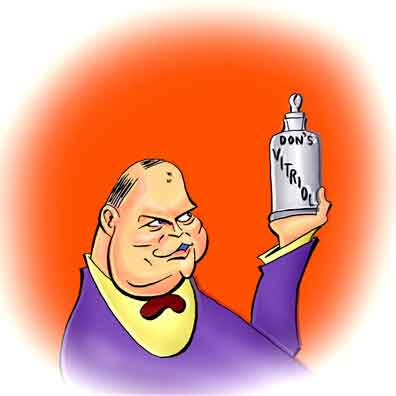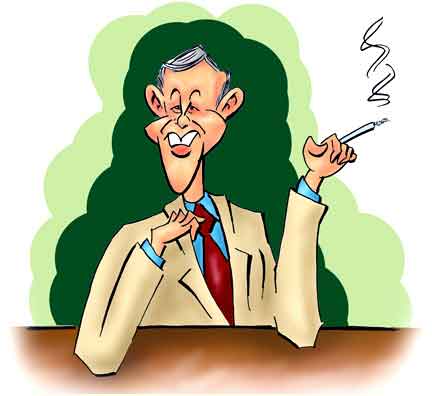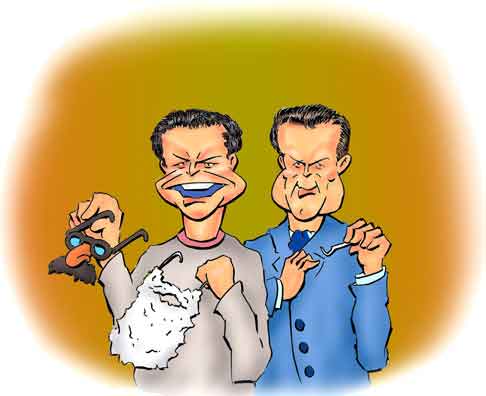Don Rickles
Mr. Warmth

The author and illustrator of CooperToons has a confession to make.
He has never been a great fan of Don Rickles.
That is, not a fan of Don's stand-up comedy. Oh, sure, it can occasionally be humorous enough, particularly when Don clearly doesn't intend you to take his barbs too seriously. But like hot chili peppers, it's best sampled in small bites.
On the other hand, it sometimes seems to be forgotten that Don was also an actor and appeared in many television shows - like his own series Sharkey CPO and in films - such as Kelly's Heroes. One of his best performances was when he played one of Maxwell Smart's old army buddies in "The Little Black Book" from the old Get Smart series. Since it was hard to keep the two Dons - Adams and Rickles - from ad-libbing, the show expended so much film that the episode had to be aired in two parts.

Johnny Carson
Don would sometimes substitute.
Don would sometimes guest-host for the Tonight Show with Johnny Carson. Although he adopted his usual persona, actually he was extremely nervous and was always afraid his appearance would be a disaster. But according to Johnny's announcer, Ed McMahon, Don needn't have worried.
On one of his Tonight Show appearances (with Bob Newhart as the guest host), Don accidentally broke Johnny's cigarette box. The box was one of Johnny's prized possessions which he'd had for years.
When he returned, Johnny didn't discover what had happened until he was on camera. Doc Severinsen (Ed was off that night) explained that Don had accidentally broken the box. Johnny then took a microphone, and followed by a mobile camera, walked across the hall to the studio where Don was in the middle of filming an episode of Sharkey CPO. The (quite funny) confrontation was broadcast live. For once, Don seemed almost abashed.

The Wild Wild West
Don was the villain.
Don didn't always play comedy. For instance, he played a villain on one of the more sombre episodes of the Wild Wild West. This was "The Night of the Druid's Blood". Don - sporting a bushy mustache - plays an evil stage magician named Asmodeus (pronounced "az-muh-DAY-us) who is in cahoots with the wife of a US senator, Astarte (played by Ann Elder), and the senator's personal physician, Dr. Tristam (portrayed by veteran character actor Rhys Williams). Asmodeus's and Astarte's and Dr. Tristam's evil plan is (of course) to take over the world. The senator is not aware of the conspiracy unfolding around him and only learns of it once Jim foils the evil plan.
If you watch the show carefully, you can see that when Jim and Asmodeus get into a physical altercation and Asmodeus threatens to skewer Jim with a spear, they switch to a stunt double for Don (Robert Conrad preferred to do his own stunts). You suspect that finding a double for Don wasn't easy, and the mustache was a necessary prop. But the double still doesn't look that much like Don.
The mustache also produced a bit of a problem in continuity. In one scene Asmodeus whacks Jim on the head, and Jim falls to the floor. But before fading to a commercial, the camera cuts back to Asmodeus, and you can see the mustache is peeling away from Don's lip. The director chose not to reshoot.
Of course, budgets for early television shows were surprisingly low compared to today, and re-shooting a scene was a luxury that the directors sometimes had to forgo. There were at least two episodes where it is blatantly obvious that Jim tore his pants. And even those scenes weren't reshot.
Don portrayed Asmodeus as a smarmy, conniving, and yet strangely insecure villain. "The Night of the Druid's Blood", though, is not one of the better Wild Wild West episodes. It also has without doubt one of the lamest and most ridiculous endings in the history of the series - or any other TV show for that matter. But we will not spoil it for the readers who have yet to see it.
References
"The Night of the Druid's Blood", Robert Conrad (actor), Ross Martin (actor), Don Rickles (guest actor), Ann Elder (guest actor), Rhys Williams (guest actor), Dick Crockett (stunt double for Don Rickles) Ralph Senensky (director), Henry Sharp (scriptwriter), Devin DeCourcey (story), CBS, 1966, Internet Movie Data Base.
"Don Rickles Recalls His 'CPO Sharkey' Days", Dave Itzkoff, The New York Times, May 15, 2015.
"Ed McMahon - Television Archive Interview", Michael Rosen, Archive of American Television, 2002.
"The Little Black Book (with an Introduction by Barbara Feldon)", Don Adams (actor), Barbara Feldon (actor), Edward Platt (actor), Robert Karvelas (actor), Jack Hanrahan (writer), Phil Hahn (writer), and James Komack (director), Get Smart - The Complete Series, 2008, (Original Air Date, January 27, 1968), Internet Movie Data Base, TV.com.
Dear Papa, Dear Hotch: The Correspondence of Ernest Hemingway and A. E. Hotchner, Albert DeFazio III, (Editor), University of Missouri Press (2005). Finding how television costs have changed over the decades takes some digging and you can find information from unexpected sources. Here in one of Hotch's letter to Papa we get an actual breakdown of costs from the 1950's. In one letter Hotch provides Ernest an itemized list of costs for a production of a television show. The total cost was about $17,000.
It's a surprise to see the low salaries for the cast (the director was originally budgeted at $250 but was upped to $750). The Adventures of Superman (1952 - 1958) started off with costs of about $15,000 per episode. Costs were kept down by using stock sets and wardrobes and keeping salaries down by signing long term contracts which didn't provide residuals for the most of the actors. Of course, some shows cost more and some cost less. Dr. Who - notoriously low budget - started off at only about $6000 per episode.
By the mid-1960's per-episode budgets were easily running $100,000 to $200,000. This was even true for what are considered low budget productions like the original Star Trek (yes, Star Trek was a low budget show).
Today, of course, TV programs cost millions of dollars per episode. Budgets of $5,000,000 isn't unusual, nor is it unusual for regular cast members to get a million dollars per episode (cast members getting $500 per episode was common in the 1950's). So we can understand why compared to shows in the 1960's, there are now about 10 - 15 minutes more commercials in a - quote - "one hour show" - unquote - and why the cost of a commercial has gone up orders of magnitude.
Ironically cable television - which was originally touted as a way to get rid of commercials - has been clocked to have more commercial time than free networks. A recent cable television show had a two hour broadcast time. But when released in a DVD (sans commercials) ran 55 minutes.
"Low Budget TV Shows That Are Better Than Most Huge Blockbuster Series", Diana Biller, i09, 2015.
"Here's Exactly Why Watching TV Has Gotten So Annoying", Victor Luckerson, Time, May 12, 2014
Superman - Serial to Cereal, Gary Grossman, Popular Library, 1976.